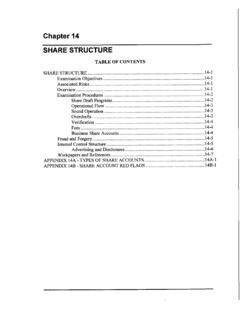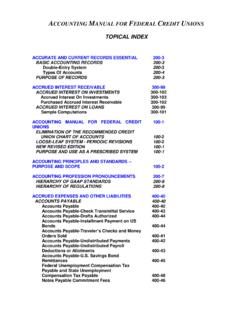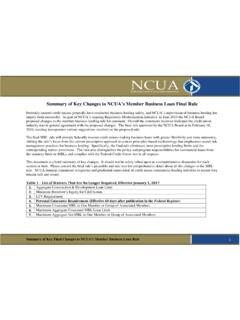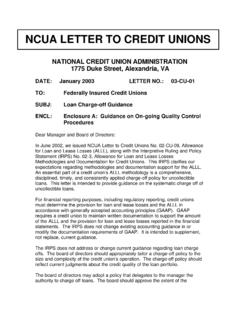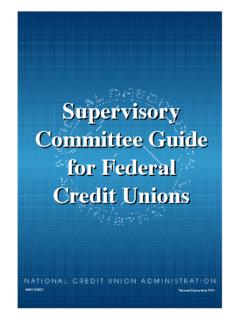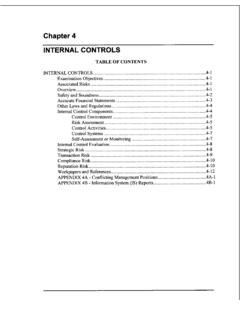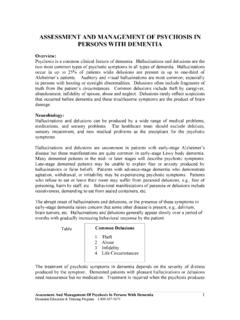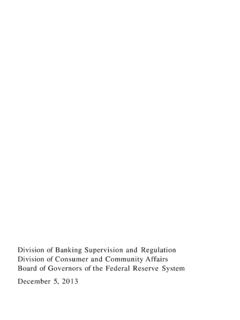Transcription of Supervisory Letter 07-01 - ncua.gov
1 Supervisory Letter NATIONAL CREDIT UNION ADMINISTRATION OFFICE OF EXAMINATION AND INSURANCE 1775 DUKE STREET, ALEXANDRIA, VA 22314 DATE: October 2007 Supervisory Letter No.: 07-01 TO: All Field Staff SUBJECT: Evaluating Third Party Relationships To expand services and product offerings, credit unions increasingly outsource functions and programs through collaboration with third parties. Developing sound third party relationships and alliances can assist credit unions in meeting their strategic objectives. Properly leveraging the skills and experience of qualified third parties may enable credit unions to: Provide access to products and services through expanded delivery channels; Offer more cost-effective products and services; and Manage programs that would not be feasible without external expertise.
2 In many cases, third party relationships are essential in enabling credit unions to become their members primary financial institution, While inadequately managed and controlled third party relationships can result in unanticipated costs, legal disputes, and financial loss, ncua s role as a regulator and insurer is not to stifle the innovative use of third party relationships to meet member needs and strategic objectives. ncua s goal is to ensure credit unions clearly understand risks they are undertaking and balance and control those risks considering the credit union s safety and members best interests.
3 ncua has previously issued several pieces of relevant guidance on managing third party risk and due diligence in recent years. Additionally, in June of 2006, ncua amended ncua Rules and Regulations, Parts 701 and 741, to address Third Party Servicing of Indirect Vehicle Loans. This Letter sets forth Supervisory principles derived and adapted from guidance issued by ncua and other federal regulatory This Supervisory Letter summarizes existing guidance and regulations, and discusses the appropriate evaluation of third party relationships where credit unions outsource key business functions.
4 If you have any questions on this issue, please direct them to your immediate supervisor or regional management. Sincerely, /s/ David M. Marquis, Director, Office of Examination and Insurance 1 Resources consulted on third party relationships are referenced in Appendix B of this Supervisory Letter . Supervisory Letter Page 1 Supervisory Letter Evaluating Third Party Relationships Third Party Relationships In recent years, credit unions have increasingly developed third party relationships to meet strategic objectives and enhance member services.
5 Properly managed and controlled third party relationships provide a wide range of potential benefits to credit unions and their members. Many credit unions have utilized third party arrangements to gain expertise, realize economies of scale, or even reach new members. Leveraging the talents and experience of third parties can assist credit unions in meeting their members needs while accomplishing their strategic goals. In some cases, third party relationships are critical to the on-going success of a credit union. Credit unions taking the time to properly evaluate and cultivate their participation in third party arrangements can experience a high degree of success.
6 Collaboration with third parties has become more prevalent in credit unions due to increasing complexity of services and competitive pressures. In some third party arrangements, credit unions surrender direct control over one or more key business functions to a third party in exchange for potential benefits. As credit unions consider the potential benefits of third party arrangements, credit union officials and management (officials) are faced with a balancing act. Officials must carefully consider the potential risks these relationships may present and how to manage them. As credit unions seek to manage risk, they should carefully consider the correlation between their level of control over business functions and the potential for compounding risks .
7 Credit unions maintaining complete control over all functions may be operationally or financially inefficient. Credit unions outsourcing functions without the RISK CONTROL Unsound Risk Inefficiency Supervisory Letter Page 2 appropriate level of due diligence and oversight may be taking on undue risk. 1 Ultimately, credit unions are responsible for safeguarding member assets and ensuring sound operations irrespective of whether or not a third party is involved. Outsourcing complete control over one or more business functions to a third party amplifies the risks inherent in those functions.
8 Additionally, credit unions trading direct control over business functions for third party program benefits may expose themselves to a full range of risks including credit, interest rate, liquidity, transaction, compliance, strategic, and reputation risks . Credit unions must complete the due diligence necessary to ensure the risks undertaken in a third party relationship are acceptable in relation to their risk profile and safety and soundness requirements. Less complex risk profiles and third party arrangements typically require less analysis and documentation. Further, where credit unions have a longstanding and tested history of participating in a given third party relationship, less analysis is required to renew the relationship.
9 risks may be mitigated, transferred, avoided, or accepted; however, they are rarely eliminated. The risk management process involves identifying and making informed decisions about how to address risk. One of the best ways to employ the risk management process is to start small and gain experience over time. Less complex credit unions unfamiliar with analyzing third party arrangements may utilize this risk management approach by entering third party relationships with small, well-defined goals and expanding their exposure to third party risks as their experience grows. When evaluating third party arrangements, examiners should ensure credit unions have addressed the following concepts in a manner commensurate with their size, complexity, and risk profile: Risk assessment and Planning; Due Diligence; and Risk Measurement, Monitoring and Control.
10 The remainder of this Supervisory Letter outlines considerations for these concepts. The considerations discussed are not an exhaustive list of all possible risk mitigation procedures, but a representation of the considerations necessary when credit unions engage in significant third party relationships. The depth and breadth of due diligence required depends upon a credit union s complexity and risk management process. Smaller or less complex credit unions may develop alternative methods of accomplishing due diligence, while credit unions utilizing a time tested third party relationship may already have addressed these considerations over time.



